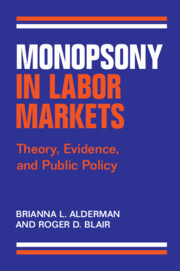
- Publisher:
- Cambridge University Press
- Online publication date:
- February 2024
- Print publication year:
- 2024
- Online ISBN:
- 9781009465212
- Subjects:
- Economics, Labour Economics, Macroeconomics

The economics of monopsony power results in lower wages and other forms of compensation, as well as reduced employment. Wealth is transferred from workers to their employers. In addition, the employer's output is reduced, which leads to increased prices for consumers. Monopsony in Labor Markets demonstrates that elements of monopsony are pervasive and explores the available antitrust policy options. It presents the economic and empirical foundations for antitrust concerns and sets out the relevant antitrust policy. Building on this foundation, it examines collusion on compensation, collusive no-poaching agreements, and the inclusion of non-compete agreements in employment contracts. It also addresses the influence of labor unions, labor's antitrust exemption, which permits the exercise of countervailing power, and the consequences of mergers to monopsony. Offering a thorough explanation of antitrust policy, this book identifies the basic economic problems with monopsony in labor markets and explains the remedies currently available.
‘Monopsony in Labor Markets is an excellent, empirically rich, and modestly technical treatment of a subject that will be especially helpful to antitrust lawyers and economists trying to sort out the effects of monopsony power on labor. The authors include full chapters on wage collusion and no poach agreements, noncompete agreements, and mergers. This book is particularly useful on questions like the extent and measurement of labor market concentration and power, tradeoffs between output and input effects, and the role of efficiencies. A must-read for an antitrust era in which harm to workers has suddenly become important.’
Herbert Hovenkamp - Dinan University Professor, Univ. of Pennsylvania Law School and the Wharton School
‘This volume elegantly summarizes a fast-growing literature on legal implications of labor market monopsony. Lawyers and policymakers interested in how the economic analysis of imperfect labor markets can be used in antitrust contexts will find an up-to-date, practical, and lucid exposition. Social scientists interested in how antitrust law has evolved to combat monopsony power will find a very readable and thorough overview.’
Suresh Naidu - Jack Wang and Echo Ren Professor of Economics, Columbia University
‘Recommended.’
R. M. Whaples Source: CHOICE
 Loading metrics...
Loading metrics...
* Views captured on Cambridge Core between #date#. This data will be updated every 24 hours.
Usage data cannot currently be displayed.